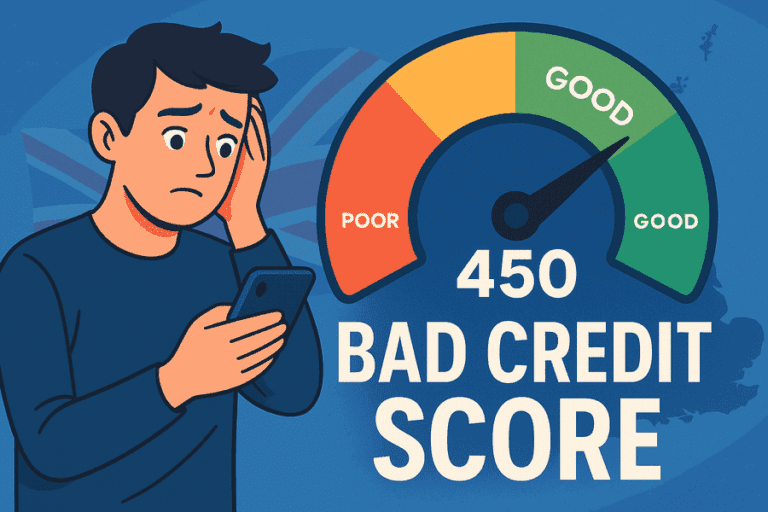
Let’s be honest, credit scores can feel a bit like mystery numbers floating around in some invisible system. You miss a bill or two, apply for a couple of loans, and suddenly your score’s dropped… but no one really explains why or what it means.
In the UK, loads of people are in the same boat – struggling to stay on top of bills and worrying about their credit score. If you’ve ever felt confused or even a bit anxious about yours, you’re definitely not alone. So, what actually counts as a “bad” credit score? And what can you do about it? Let’s break it down in plain English.
What Even Is a Credit Score and When Is It “Bad”?
Think of your credit score like your financial trust rating. It’s a number that tells banks, lenders, and sometimes even landlords how reliable you are when it comes to borrowing money. The higher your score, the more likely they are to say “yep, we’ll give you that loan.” The lower it is… well, let’s just say things get a bit trickier.
In the UK, we’ve got three big credit reference agencies: Experian, Equifax, and TransUnion. They each have slightly different scoring systems, but the idea’s the same, scores tend to range between around 700 and 999. If you’re sitting in the lower end of that scale, particularly under 560 with Experian or 440 with Equifax, that’s typically classed as a “bad” or “very poor” score.
Now, here’s the thing… this isn’t the end of the world. A bad credit score doesn’t mean you’re irresponsible or hopeless. It might just mean you’ve had a few bumps along the way. Maybe you’ve missed a payment. Maybe you haven’t borrowed much before, so there’s not a lot of history to go on. Whatever the case, it’s not carved in stone. You can change it.
What Can Drag Your Score Down?
Credit scores don’t just drop for no reason. There’s usually a pattern. And once you spot it, you can start turning things around. Here are some of the most common culprits behind a poor credit rating:
- Missed or late payments: Forgot a credit card bill? Skipped a loan repayment? It happens. But even one or two of these can leave a mark on your credit report and that mark sticks around for up to six years. Ouch.
- CCJs and big-time defaults: Got a County Court Judgment (CCJ) or been through bankruptcy? These are serious red flags for lenders. They tell people you’ve had major trouble repaying debt in the past.
- Maxed-out cards or high debt: Using up most of your available credit? Lenders don’t love that. It gives the impression you’re stretched thin, even if you’re paying everything on time.
- Too many credit applications in a short space of time: Say you apply for three loans in two months. Even if you don’t get them, the fact that you’ve applied can spook lenders. It makes it look like you’re desperate.
- Barely any credit history (“thin file”): Funny enough, having never borrowed before can actually hurt your score. Lenders want proof that you know how to manage debt. No history = no proof.
- Credit report errors or dodgy links: Ever shared a joint account with someone who’s had financial trouble? Their score might be dragging yours down. Or maybe there’s a mistake in your file – an old address, a wrong missed payment, stuff like that. Always worth checking.
The good news? All of these are fixable. Sure, it might take a little time and effort, but there’s plenty you can do to steer your score in the right direction.
Why a Bad Credit Score Can Be a Real Pain
Here’s where things get a bit more frustrating. A bad credit score doesn’t just mean you can’t get a big loan. It can mess with all sorts of things in your day-to-day life.
Let’s say you want to buy a car on finance or get a new credit card. If your score’s low, lenders might flat-out say no or offer you a deal with sky-high interest. That means you end up paying way more than someone with a better score, even for the exact same product. Not exactly fair, but that’s the system.
It can also affect things like:
- Renting a flat: Landlords or letting agents might ask for a bigger deposit or even reject your application.
- Mobile phone contracts: Some networks might turn you down or ask for upfront payments.
- Monthly car insurance payments: A low score could mean you’re stuck paying everything in one go instead.
- Jobs (yep, really): If you’re applying for certain roles, especially in finance or law, employers might check your credit history as part of the process.
Sounds a bit intense, right? But before you start to panic, there is hope.
There are lenders out there who specialise in working with people who’ve had credit struggles. You might be able to access things like bad credit loans, homeowner loans, or even a second-charge mortgage if you’ve got property. These types of loans can help bridge the gap while you work on improving your score.
This is where a broker like Beagle Finance comes in. We’re not a lender, we’re more like your financial matchmaker. We help people (especially those with less-than-perfect credit) find providers offering deals that actually make sense for their situation. It’s less about trying every lender out there and more about being strategic and saving your time, energy, and credit score in the process.
How to Start Rebuilding Your Score (Without Losing Your Mind)
If your credit’s taken a few hits, don’t worry. It doesn’t have to stay that way. Here are some genuinely doable steps to help you start repairing your score. Nothing wild, just simple stuff that works:
- Get your hands on your credit reports. You can check all three (Experian, Equifax, and TransUnion) for free. Spot anything odd? Fix it. That wrong address or mystery missed payment could be tanking your score unfairly.
- Start paying everything on time, no exceptions. Missed payments are credit score kryptonite. Set up reminders, direct debits… whatever it takes to keep things ticking over. If this is not possible you may need to restructure the debt by clearing it with a remortgage or secured loan.
- Pay down your balances (a little goes a long way). Try not to use more than 30% of your credit limit on any one card. So if your limit’s £1,000, aim to stay below £300. Again, if this is proving difficult it may be best to restructure the debt to reduce the interest rate and minimum payments.
- Cut back on new credit applications. Too many in a short period is like shouting, “I’m desperate!” Try pre-approval tools instead – these don’t affect your score.
- Register to vote. Honestly, this one’s underrated. Being on the electoral roll helps confirm your identity and can nudge your score up.
- Keep your oldest accounts open. Even if you don’t use them, long-standing accounts give lenders a sense of consistency. Just make sure there are no fees lurking.
And here’s one more tip that might surprise you – taking out a bad credit loan could actually help you improve your score, as long as you repay it on time. Want to know how that works? Here’s a full breakdown of when it helps (and when it doesn’t).
Take the Next Step Towards Better Credit
Look, rebuilding your credit isn’t glamorous. It takes patience. It’s not instant. And sure, some of the rules feel a bit unfair. But here’s the truth: it’s 100% doable. Every on-time payment you make, every smart credit choice you stick with – it all adds up.
And you don’t have to do it solo.
If you’re unsure where to begin or which lenders might give you a chance, Beagle Finance can help you figure it out. We’ll show you personalised loan options that actually fit your credit situation, without pushing you into something that’s not right for you.
So… ready to see what’s possible?
Get Your Personalised Quote from Beagle Finance – it’s quick, no strings, and could be the first step toward better credit.
